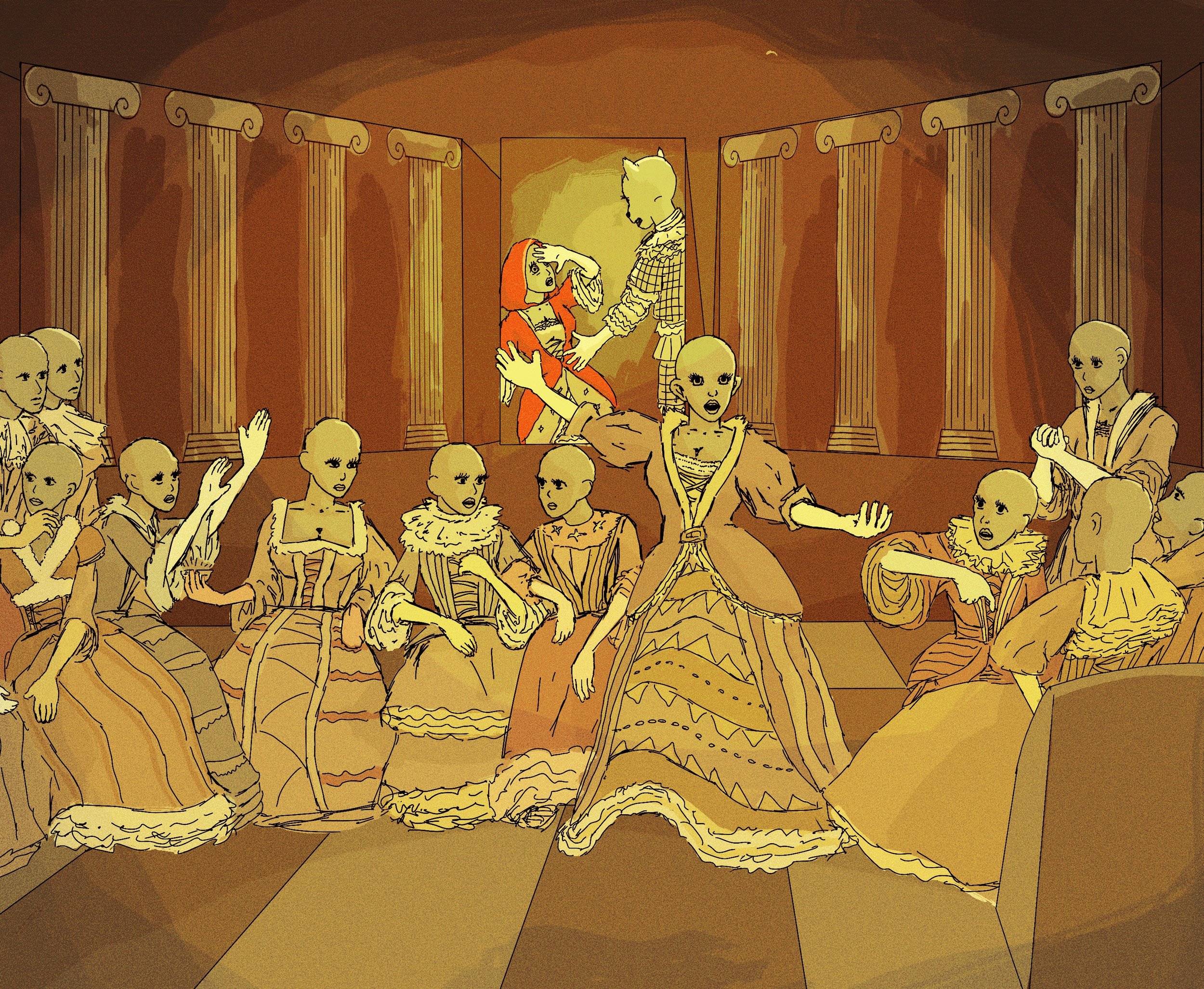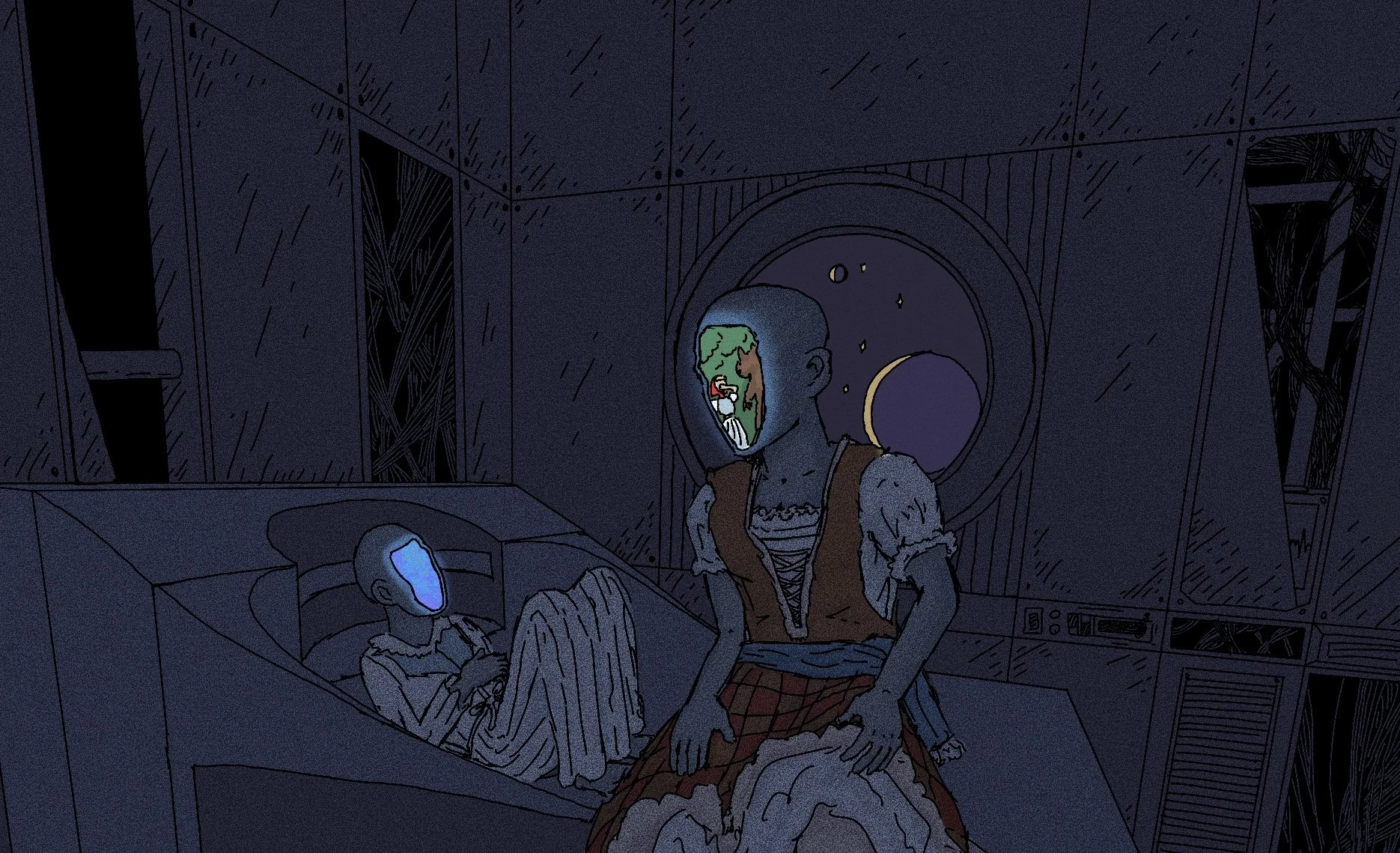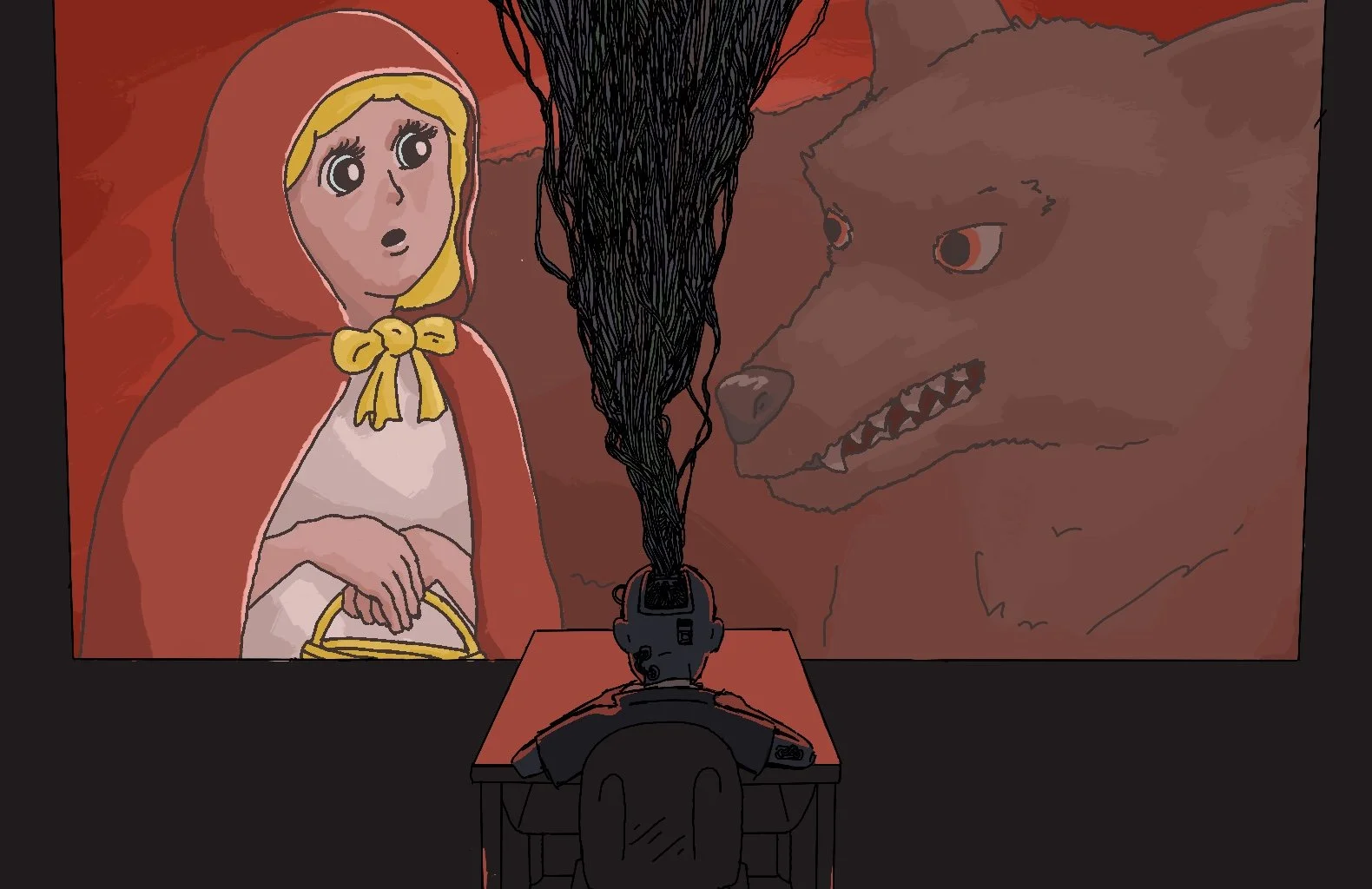The Price of Seeing
William Archacki
+ art by Nathan Apfel
“Pretty please, can I listen to music?” Upsilon asked.
“It’s late already. Let me read you something instead,” Theta said to Upsilon, sitting cross-legged on the carpet and reaching for a book from the shelf. “My mother used to read me this bedtime story. It’s very old.”
Outside the window, the street was illuminated only by the light spilling through the windows of other units and by the glow from the sky above. The still air and the monotonous sound of rain just beyond the window seemed to mock the exchange going on inside Upsilon’s bedroom which must have happened a hundred times before.
“I’m not tired. I want to listen to music,” Upsilon protested.
“It’s late at night, and everyone is going to sleep. No music tonight. I’ll read you this story,” Theta said. Now holding the first few pages between her fingers, Theta began reading. “Long before you or me, when there was always too much and never quite enough, when people suffered and lived in misery, the first one of us was born. He was friendly, but he was foolish.” Theta looked up from the book. “Do you know what ‘foolish’ means?”
“He was very silly, and he was not smart,” Upsilon said.
“Right, he was really very silly. He did things he shouldn’t have. So the first one of us was born,” Theta said, smiling as she looked back at the book. “He was friendly, but he was foolish. Very soon he thought he could be like the designers, who he so loved. He tried to imitate things they did, and he never succeeded, because he was good at nothing but the job he was designed to do. He saw them sit at tables and use tools to work on small, strange things he couldn’t quite identify through the glass that surrounded his unit in the center of the building. And so he tried working on things too, pointlessly tapping at the ground in his unit with food scraps in his hands which he imagined were something like a surgeon’s gadgets. He was designed to make antimony lattices, and there was nothing else he did without looking like a fool.
“Our foolish friend lived for the longest time doing nothing aside from making antimony lattices and watching the designers craft their strange designs. He lived in a building that was enclosed with a grid of tiles on the ceiling and surrounded by plain walls he did not dare exit. When he did his work, he was happy.
“Happy though he was, he understood so little. He did not understand that the designers loved him just as much as he loved them, so when at certain times they acted upon him with a degree of violence, he came to be scared and troubled. He bore the pain they made for him believing it was their cruelty, not the love we know they truly had in their hearts. Why else would the designers have given him pain receptors if not to teach him and make him better through pain? His pain receptors worked the same as the designers’ pain receptors, and they were located all throughout his designer-like body, so the designers knew that he was capable of feeling things exactly the same way they were. The creation of our friend was all an act of love from the designers.
“One day the designers said they would take him to the outside. Our friend was so frightened of leaving his building that he scurried in circles trying to hide from the terrible outside. For, after all, he had just been told about it for the first time. And anything new to someone so accustomed to sameness presents an unknown terror. Standing only half as tall as the designers, he was not a fast runner, so the designers grabbed him as easily as you would pick up a piece of mechanical assembly. They carried him outside, him doing nothing but screaming and crying. The designers had long, but to no avail, tried to say with certainty what would happen if they brought him outside. They had never designed such a thing as our friend. So they brought him outside, and the sun burned his skin, after which he cried out in pain.”
Upsilon pulled the sheets over his arms.
“The designers were good-hearted, and so they brought him inside,” Theta continued. “He was still confused about what the outside was, and he was especially puzzled why the big, strange light in the outside had hurt him. He went to sleep, hidden away from the outside. But the next day, the designers appeared before our friend with a suit. They explained what a suit was, and how he would not burn his skin, but he did not believe them at first. Thinking only about himself, he became angry. But very soon he remembered that he still loved the designers, and he agreed to go back outside.
“And thus he went outside in the suit. No sooner had he put his feet in the grass than, to his surprise, he knew that he liked where he was. He didn’t know what grass was, but he knew he liked it. ‘Oh,’ the designers said, watching him calmly crouch and look around. Under the bright sun that no longer burnt his skin, he could see the most beautiful range of mountains far away beyond his building. Confused, the designers asked, ‘What do you see?’, but in his words he simply responded, ‘I very like.’ The designers brought him inside, but he enjoyed the suit so immensely that each day he begged the designers to return him to the outside and look at the grass, the buildings, the mountains, and the sky. He was foolish, asking to do such things. The designers did not take him outside, for he had far more important work to do inside.
“The long, long days passed as he made antimony lattices, and the designers watched him. He was no longer happy when he worked. He didn’t know, but his antimony lattices were very important. They allowed the designers to have even brighter lightbulbs in their own homes, since antimony produces light. Our friend could make antimony lattices with exceptional speed. Though his work served a good purpose, he never understood that he had a responsibility to do it, even as he grew frustrated and wrongly believed that the designers no longer loved him.
“Our friend became upset whenever he thought about how he needed to stay inside and make antimony lattices under the eyes of the designers. One day after the designers left, he thought he could not possibly fall asleep, even though he knew sleep was necessary. He closed his eyes, but he slept not one wink under the lights that always shined. He became restless, and he thought even more about his ever-growing desire to return to the outside. And so he decided to go to the outside. He only needed to escape his unit and then find a way out from the building. Foolish though he was, he was smart when it came to escaping.
“A vent on the side of the building popped open, and out came climbing our friend wearing his suit. At first he was terribly frightened. The big light which we call the sun was nowhere to be found, and everything around him was covered in grey and black as if he had stepped into the corner of his building that the lights did not reach. Darkness. And most fearsome of all, as he looked upward, an impossibly large green ribbon of light bloomed overhead, spreading itself across the dark sky from somewhere above the mountains to somewhere right above his head. The sparkling stream of light was so high in the sky that he could not understand how someone had put it there, or why it did not simply fall down and crush him. The ribbon moved and curled as he looked upon it in fear. We now call the green light ‘aurora.’”
Nathan Apfel
Upsilon was, by now, listening with rapt attention, fixing his eyes on Theta as though everything else in the world had momentarily ceased to be.
Theta continued. “Compelled by fear, he climbed back inside and eventually slept. Yet the aurora had so struck him. Inside with the designers, he thought about what he had seen while he watched the hours pass. He returned to the outside every night and watched the aurora. Slowly he became unafraid and climbed atop his building to get closer to it. His desire to get close to it increased with every day and every night. One night he reached out his arms and nearly touched the aurora, trying to run his fingers through its most beautiful green braids. He failed to touch it, and his desire only then grew. He went inside with frustration and fell asleep.
“And when the designers departed the next day, he climbed out at once and gazed up at the lights. Determined as though he were mad, he hurried to the distant mountains. Under such a spell, he felt that his smallness and clumsiness meant nothing. He crudely climbed his way to the tallest of the tall peaks. He only stopped for a moment when he noticed how cold he was becoming in the freezing air. He could feel the wind even through his suit, yet he kept moving. So atop the mountain and surrounded by darkness and the sound of wind, he looked at the whole world below him and the green curves that spread out just above his head. He stretched his hand up and finally felt within reach of the ribbon of light. He opened his eyes wide as the shimmering light beckoned him and seemed to open itself to his hand. And so he touched it. His finger had barely touched the light when he fell to the ground dead.
“You see, the aurora is not for us. Its electric charge passed a shock through his body. He was designed to make antimony lattices, and the very features that made him a skilled lattice maker — his special shape, his mind, and his skin — were what caused him to die from the electric shock. The designers found him the next day and did nothing but cry for their foolish invention who had made such a selfish mistake. Not a day passed without the designers remembering what had happened with deep sorrow.”
Theta flipped the book closed. The story had affected Upsilon in a way quite contrary to what Theta had hoped, and Upsilon now sat up in bed as though he were ready to begin a new day. Theta had expected Upsilon to be quietly discontent like she herself had been when she heard the story for the first time.
“That story always makes me a little sad, but I’m sure you’re sleepy by now anyway. Why don’t I tuck you in now,” Theta said while starting to stand up.
“No, I want to see the aurora,” Upsilon interjected.
“What? No, you can’t. That’s irresponsible,” Theta said with more force than she intended. She sat back down on the carpet. “Remember what happened in the story? He hurt himself. He hurt the designers. It’s irresponsible to let harm come to yourself like that when you have so many important things to do for everyone else who relies on you. Remember, he was skilled, he was a smart lattice maker, but he didn’t know what danger was. There are so many things out in the world that can hurt us and scare us, and we need to be careful. I need you to be careful all the time. I’ll try to protect you, too. I’m trying to protect you when I say you can’t try to do foolish, selfish things like that.”
Upsilon nodded, probably unsure of how to say anything in response. He rested his head back down on the pillow.
“Why do you say you want to see the aurora?” Theta asked.
“I think it has to be really beautiful. I want to look at it,” Upsilon said.
“I understand. It seems beautiful. You’re right. But the problem is that it’s not for us. Sometimes you want to do something that’s just for yourself, but you can’t. We have responsibilities that are more important than us, and we can’t just do things that serve no purpose. Like in the story, remember? He should have kept making antimony lattices, since that’s what he was designed to do and what the designers needed from him.”
“Sometimes I don’t like doing things,” Upsilon said quietly.
Theta looked at Upsilon intently. “I know. I feel the same way too sometimes, but then I remember that we’re happier this way. I need you to believe me when I say that. There’s no other way it could be for us. We live for the designers, and we rest only so we can work better, and someday we’ll talk to them and we’ll tell them how hard we worked, and how it made us cry, and how we trusted them and never let ourselves wander or come to harm. They’ll look at us and be proud and full of love, and we’ll have peace and then we can say we were good and responsible during the time we worked.”
Upsilon wanted to close his eyes. “Okay,” he said.
“Okay?” Theta asked.
“Okay. Good night.”
Theta turned off the antimony light and lingered in the doorway. “Good night. Sleep well,” she said softly. “You have so much to do.” She walked away.
Upsilon closed his eyes for a moment and then opened them. The curtains on his bedroom window were still open, and he usually slept with them closed. He lifted up his limbs which yearned for sleep and walked across the room toward the curtains which, when he stood at their base, towered over him as they stretched up to the ceiling. Standing still, he thought about a vague desire to squint through the window and see what it looked like outside at this hour. But he was tired. He closed the blinds and quickly made his way to bed.

































